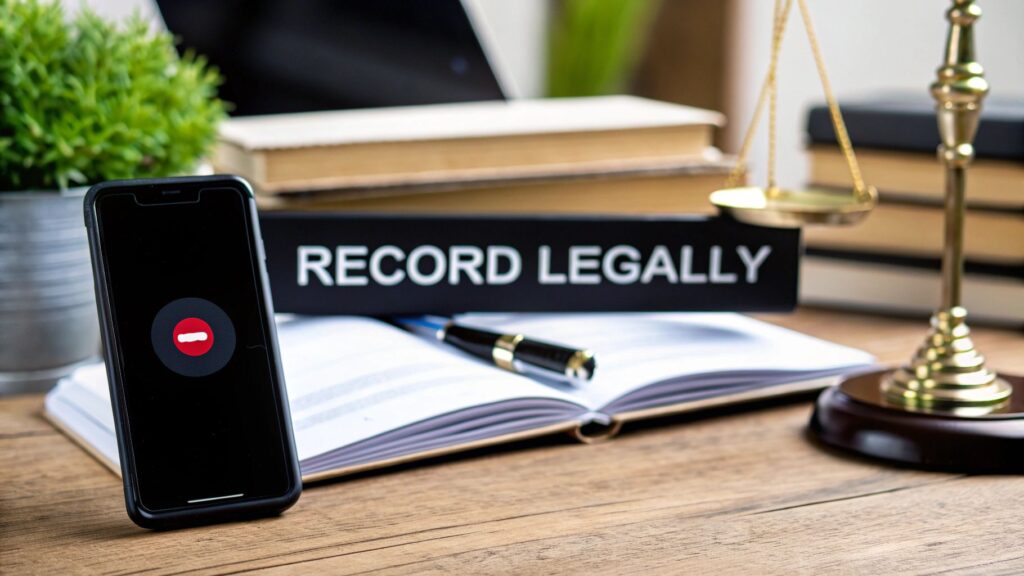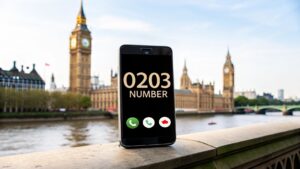Yes, in the UK, it's generally legal to record a conversation you're part of for your own personal use, even without telling the other person. But—and it’s a big but—the moment you share that recording, you could find yourself in serious legal trouble. For businesses, the rules are completely different and much stricter, governed by data protection laws like UK GDPR.
Your Quick Guide to UK Conversation Recording Laws
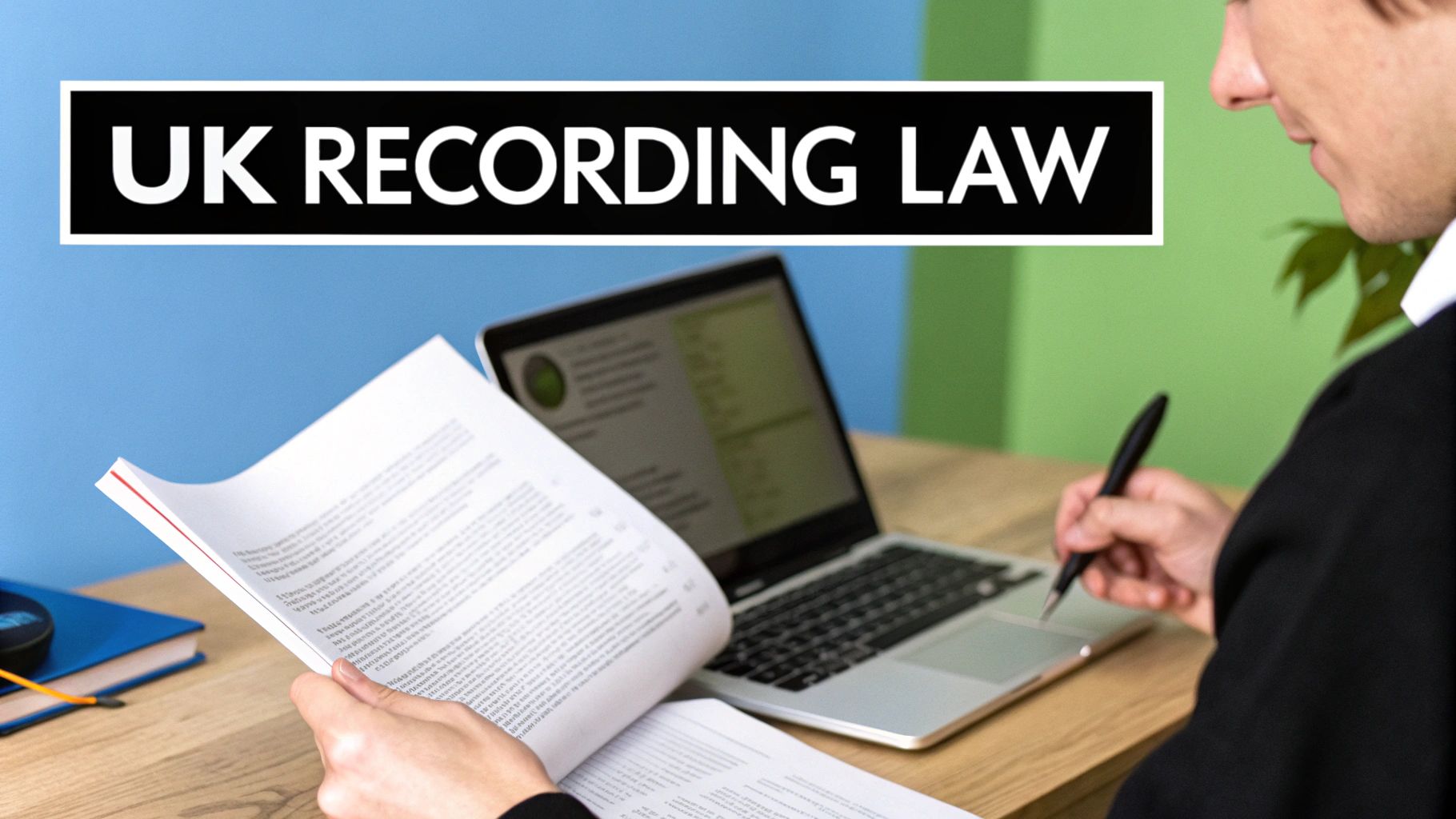
Have you ever been on a call, perhaps with a difficult client or a utility company, and thought, "I really wish I was recording this"? It’s a common impulse, but whether it’s actually allowed isn't a simple yes or no. The answer depends entirely on who you are and why you're hitting the record button. The law draws a very clear line between recording for personal reasons and doing so as part of a business.
Think of a personal recording like a private diary. You can jot down notes from a conversation to jog your memory, and an audio recording is just the modern-day equivalent. As long as you were part of the conversation and it's strictly for your own ears, the law generally considers it a private matter.
However, things change dramatically when a business is involved. That recording is no longer just a personal memo; it's now officially classified as personal data. This shift brings a host of powerful regulations into play, mainly the UK GDPR and the Data Protection Act 2018 (DPA 2018), both designed to fiercely protect individual privacy.
Personal vs. Business: A Clear Distinction
The rules for recording conversations in the UK hinge on this personal-versus-business context. The Regulation of Investigatory Powers Act 2000 (RIPA) is what allows an individual to record a conversation they're participating in without needing to notify the other person. This is often called 'one-party consent'.
So, if you’re on a phone call, you can legally record it for your own reference without telling anyone. However, sharing it with a third party is almost always off-limits unless you have explicit consent from everyone involved. For a deeper dive into the specifics, airlandline.co.uk offers some great insights into UK recording laws.
This is a world away from the rules for businesses. While you might record a call to remember the details of a billing dispute, a company must have a clearly defined lawful basis for recording. This could be to fulfil a contract, comply with a legal obligation, or for quality and training purposes—and they must inform the other party that the call is being recorded.
The core difference lies in purpose and scope. A personal recording is for one person's memory; a business recording is a form of data processing, subject to strict legal oversight and transparency.
To help break this down, let's look at the key differences in a simple table.
UK Conversation Recording At a Glance
This table gives a quick summary of the main rules you need to know, comparing personal and business recording scenarios.
| Scenario | Consent Required? | Can You Share It? | Key Legislation |
|---|---|---|---|
| Personal Use | No, if you are part of the conversation. | No, not without consent from all parties. | RIPA 2000 |
| Business Use | Yes, you must inform the other party. | No, except for specific, lawful reasons. | UK GDPR, DPA 2018 |
As you can see, the moment a recording is made for any reason beyond your own private use, the legal goalposts move significantly, placing the responsibility on transparency and accountability.
Your Rights When Recording for Personal Reasons
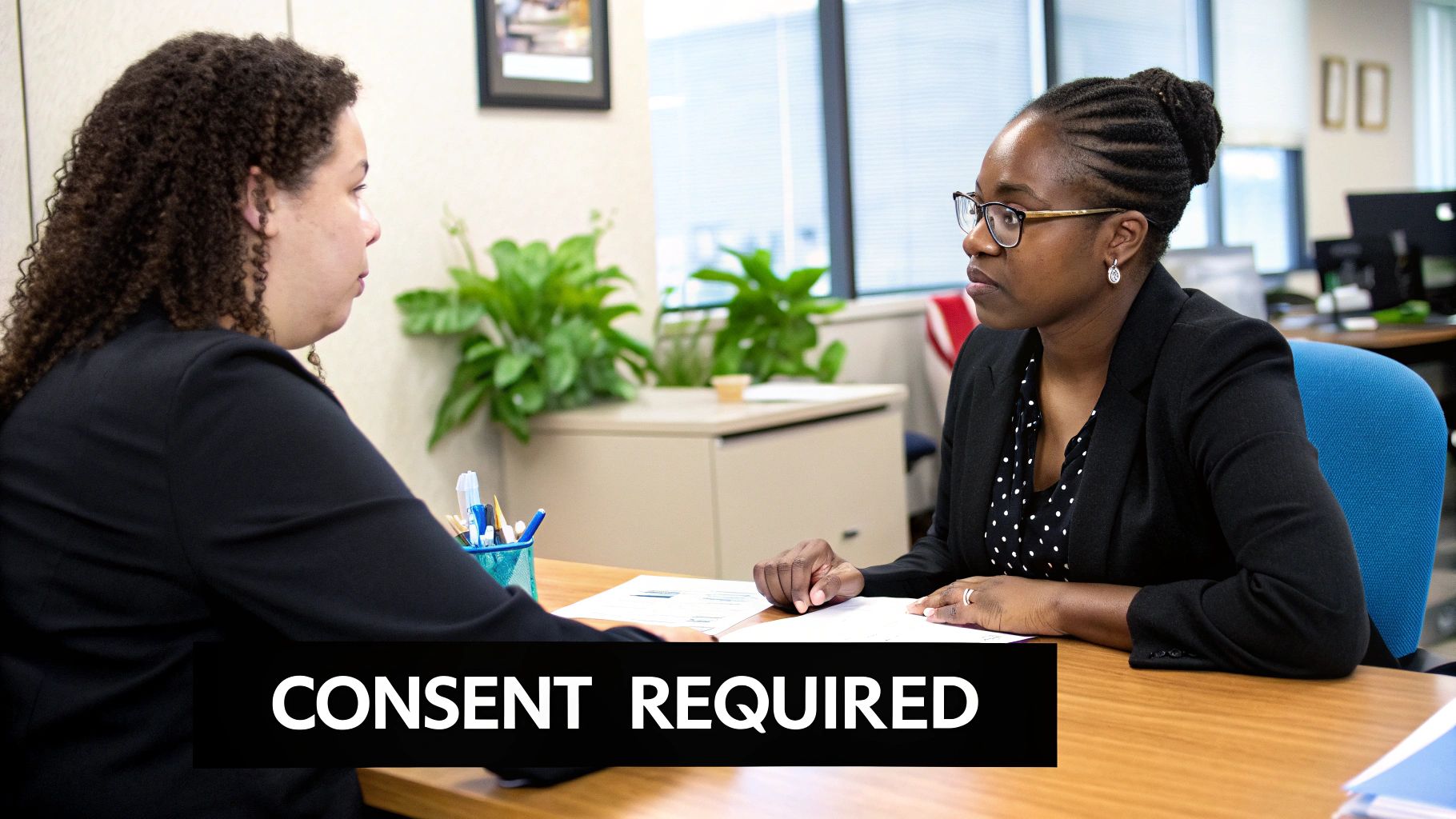
So, you're asking, "is it legal to record a conversation in the UK?" When it comes to your personal life, the rules are surprisingly straightforward. The main law to know here is the Regulation of Investigatory Powers Act 2000, or RIPA. It sounds complicated, but for personal recordings, it boils down to a simple principle.
At its core, RIPA allows for what’s often called 'one-party consent'. In plain English, this means if you're a participant in a conversation, you are legally allowed to record it for your own use. You don't have to announce you're recording, and you don't need the other person's permission.
Let's say you're on a challenging call with a utility company trying to sort out a billing error. You hit record on your phone to keep track of what they promise. Under RIPA, that's perfectly fine. You're part of the conversation, and the recording is for your own reference.
What Counts as 'For Personal Use'?
This is the all-important distinction. The law is very specific. A recording is for your personal use if it's meant for your ears only—to jog your memory, keep your own records straight, or simply to refer back to. Think of it as an audio diary entry for a specific event.
Here are a few everyday situations where this applies:
- Confirming a verbal agreement: You discuss the details of a small freelance job over the phone. Recording it gives you a precise record of the agreed-upon tasks and payment.
- Logging a dispute: You're in a disagreement with a landlord and want an accurate account of a conversation for your own files.
- Understanding complex information: A financial advisor walks you through some complicated investment options, and you record it so you can review the details later at your own pace.
In all these cases, the recording is just a personal note-to-self. The key is your intention. You're not planning to play it for anyone else; you just want an accurate record.
The moment your goal changes from keeping a private record to sharing it with others, you step onto shaky legal ground. What was a protected personal note can quickly become a violation of someone else's privacy.
The Problem with Sharing a Private Recording
While hitting 'record' for yourself is generally okay, hitting 'send' or 'post' without permission is where you can land in hot water. Sharing a private recording on social media, emailing it to others, or publishing it online opens you up to the risk of a civil lawsuit.
A common legal claim in these situations is for 'breach of confidence'. This happens when information was shared with a reasonable expectation of privacy, and you go on to disclose it without consent.
Imagine this: you record a candid chat with a friend who's venting about their boss. If you then forward that recording to their manager, you've done more than just share a file. You've likely breached their trust and could be sued for damages. The legal focus shifts dramatically from your right to record to their fundamental right to privacy. The bottom line? Keep personal recordings personal.
How Businesses Must Handle Conversation Recording
When a business presses record, it’s not just capturing sound—it's processing personal data. That single act moves the recording from the relaxed rules of personal use into a much stricter legal arena. For any organisation in the UK, getting this right isn’t just good practice; it's a legal requirement.
Think of it this way: a personal recording is like a private diary. But once a business is involved, that recording falls squarely under the UK GDPR and the Data Protection Act 2018. Why? Because a person's voice, when linked to them, is just as much personal data as their name or email address.
This means a business can't just hit record whenever it wants. There must be a solid, legally recognised reason for doing so, known as a 'lawful basis'. This is the foundation of data protection, ensuring that people's privacy is respected and data is only collected for legitimate, transparent reasons.
Finding Your Lawful Basis for Recording
Before you even think about recording a call, you must identify which of the six lawful bases under UK GDPR justifies it. Simply wanting a record isn’t good enough; your reason has to align with one of these specific legal grounds.
Here’s a look at the six lawful bases and how they might apply when a business records a conversation.
Lawful Bases for Recording Conversations in Business
| Lawful Basis | Description | Example Business Scenario |
|---|---|---|
| Consent | The person has given clear, affirmative permission for you to record them for a specific purpose. | A customer actively agrees to have a support call recorded for troubleshooting purposes after being told why. |
| Contract | The recording is necessary to fulfil a contract you have with the individual. | Recording a telephone booking where a customer verbally agrees to the terms and conditions of a purchase. |
| Legal Obligation | You are required by another UK law to make the recording. | Financial services firms are often legally mandated to record calls relating to transactions to prevent fraud. |
| Legitimate Interests | You have a genuine business reason to record, which is balanced against the individual's rights. | Recording calls for "quality and training purposes" to improve customer service, as long as it's not overly intrusive. |
| Vital Interests | The recording is necessary to protect someone's life. | An emergency medical helpline recording a call to ensure they have accurate details to pass to paramedics. |
| Public Task | The recording is necessary for you to perform a task in the public interest or for official functions. | A local council might record a call to its public services line to ensure accurate record-keeping. |
It's crucial to identify and document your chosen lawful basis before you start recording. This isn't just a box-ticking exercise; it’s a core part of your legal accountability. You need to be ready to justify your decision to regulators like the Information Commissioner's Office (ICO).
The Critical Role of Transparency
Even with a solid lawful basis, you can't record in secret. Transparency is non-negotiable. That familiar phrase, "This call may be recorded for quality and training purposes," exists for a very good reason—it’s a legal requirement.
The Data Protection Act 2018 and UK GDPR demand that you are upfront about your recording practices. Recording conversations covertly in a business setting can lead to serious trouble, including breaches of data protection law and even human rights. For a deeper dive into these obligations, you can discover more insights about UK recording laws on sprintlaw.co.uk.
To stay on the right side of the law, your notification must be:
- Prompt and Clear: Let the person know they're being recorded right at the start of the conversation.
- Specific: Explain why you're recording (e.g., "for training," "to confirm your order," "for regulatory compliance").
- Helpful: Point them towards your privacy policy for more detailed information on how their data is managed.
This is all about fairness and giving people control over their own data.
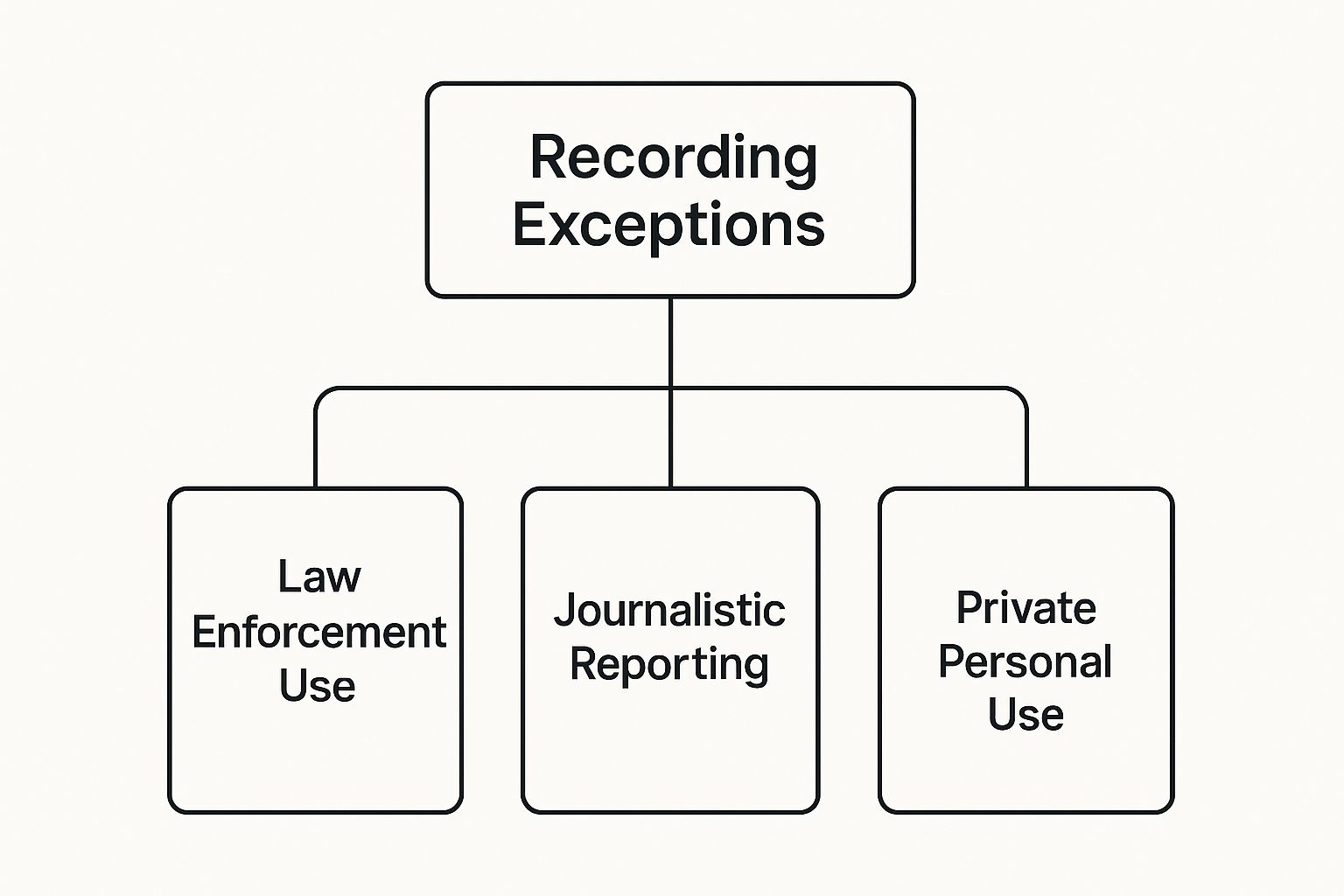
While there are niche exceptions—like for law enforcement or journalism, which operate under different rules—they simply don't apply to the vast majority of businesses. For almost everyone, the path is clear: establish a lawful basis, be transparent, and respect people's privacy.
Navigating Covert Recordings in the Workplace
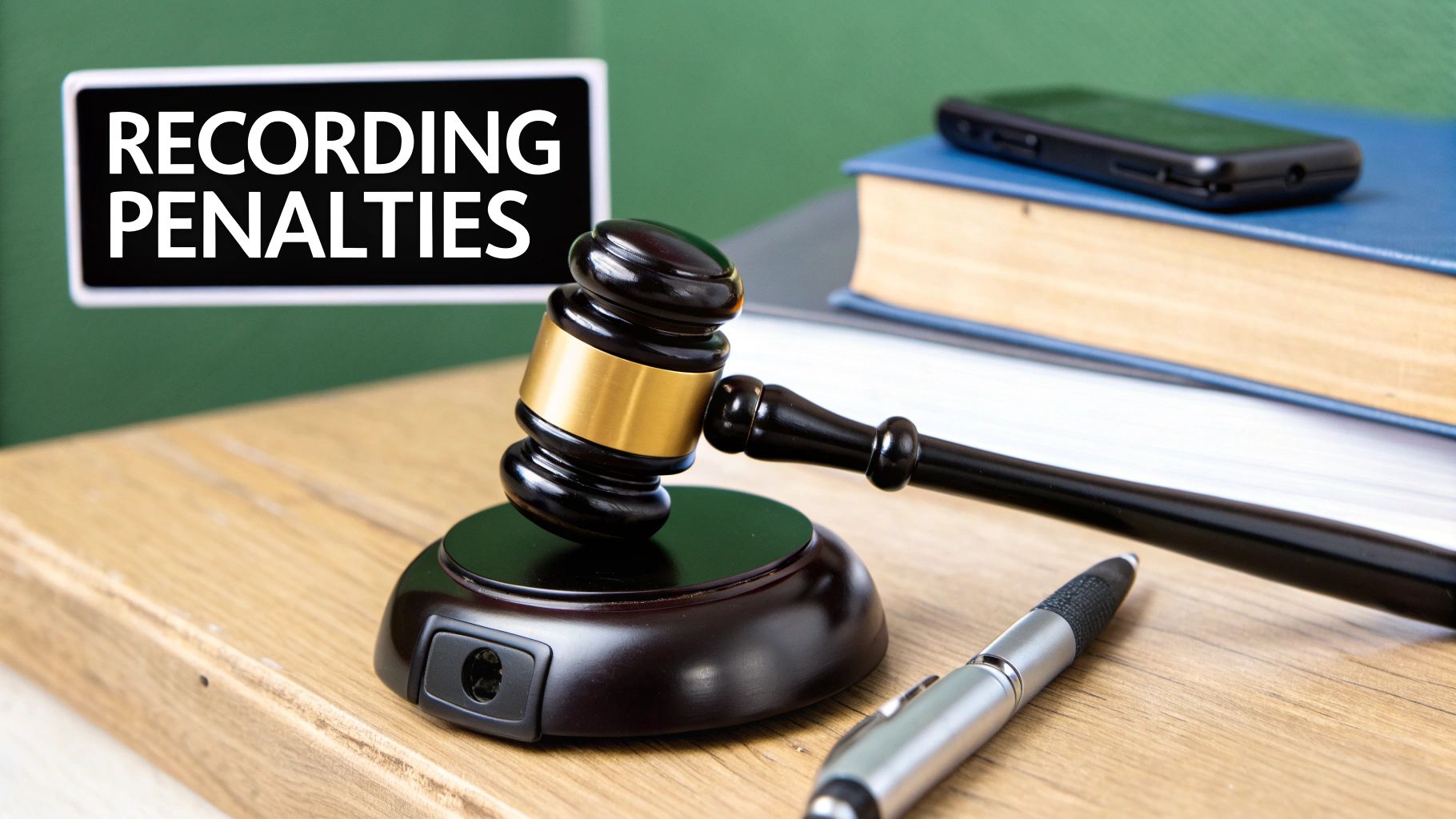
The workplace adds a whole new layer of complexity to the question, "is it legal to record a conversation in the UK?". Whether it’s an employee feeling vulnerable or a manager growing suspicious, secretly hitting 'record' can feel like a last resort. This is a genuine legal minefield, and a wrong step can have serious consequences for everyone involved.
While the general principles of transparency still hold true, the unique power dynamic in an employment relationship changes things. For employers, secretly monitoring staff is almost always a non-starter, risking breaches of both data protection and human rights law.
On the other side of the desk, an employee might feel they have no choice but to record a disciplinary meeting or a tough conversation with HR. This is where personal rights and professional duties clash, often leaving employment tribunals to sort through the aftermath.
An Employer's Limited Right to Record
For any business owner or manager, secretly recording your team is an incredibly risky move that’s rarely, if ever, justifiable. The legal bar is extraordinarily high. You can't just start recording people because you suspect they're slacking off or committing minor misconduct.
To even consider it, you need a serious, compelling reason—usually involving suspected criminal activity or gross misconduct that you can't investigate any other way. For example, if you have solid evidence pointing to theft or fraud within the company, targeted covert recording might be seen as a last resort.
Even in these extreme situations, you’re legally required to conduct a thorough Data Protection Impact Assessment (DPIA). This isn't just a formality; it involves:
- Pinpointing the specific crime or serious issue you're investigating.
- Clearly justifying why covert recording is the only way to get the evidence.
- Restricting the scope of the recording to the absolute minimum necessary.
- Putting tight controls in place to keep the recording secure and limit who can access it.
Cutting corners here could lead to massive fines from the Information Commissioner's Office (ICO) and completely destroy trust with your employees.
An Employee's Secret Recording as Evidence
A far more common scenario is an employee secretly recording a meeting, like a disciplinary or grievance hearing. They might be trying to get an accurate record of what was said or feel they're being misrepresented. This begs a crucial question: can that secret recording actually be used as evidence in an employment tribunal?
The answer, surprisingly, is often a qualified "yes". Although making the recording might have broken company policy and damaged the trust between employer and employee, tribunals frequently allow such recordings if the content is relevant to the case.
A tribunal’s main job is to uncover the truth. If a secret recording contains clear evidence of discrimination, unfair treatment, or a manager failing to follow proper procedure, a judge is very likely to listen to it, even if they don't approve of how it was made.
Case law shows that tribunals balance a few factors. They'll consider the employee’s motive—were they trying to trap their manager, or did they genuinely want an accurate record of a stressful conversation?
Most importantly, they look at the relevance of the content. A recording that catches a manager making a discriminatory comment is far more likely to be admitted than one that just captures a standard, by-the-book meeting.
A word of caution for employees, though: any part of a recording that captures the private deliberations of managers—say, after you've left the room—will almost certainly be thrown out. It's a gamble, but for some, it's a gamble that pays off.
The Real Consequences of Unlawful Recording
It’s easy to think of the UK’s recording laws as just red tape, but underestimating them is an expensive mistake. Getting this wrong isn't a minor slip-up; it can lead to severe legal and financial penalties that could seriously damage your business. These aren't just empty threats in a rulebook—they are real consequences that show just how seriously privacy is taken.
The main regulator you need to know about is the Information Commissioner’s Office (ICO). Think of them as the UK's data protection watchdog. They have significant power to investigate and fine organisations that don’t follow the rules set out in the UK GDPR and the Data Protection Act 2018.
If you ignore these regulations, you can expect the ICO to take an interest. The UK has a track record of taking these breaches very seriously, with the ICO handing out millions in fines over the years. Under UK GDPR, the maximum fine for a serious breach is a jaw-dropping £17.5 million or 4% of your global turnover—whichever is higher. That figure alone should tell you everything you need to know about the financial risks. To get a better handle on the specifics, it's worth taking a look at these insights into UK recording laws from Cloudtalk.
Fines from the Information Commissioner's Office
The ICO doesn't issue maximum fines lightly, but their power to do so sends a clear message: get your house in order. When deciding on a fine, the ICO looks at the whole picture, not just the recording itself.
They’ll weigh up several factors, including:
- The nature and severity of the infringement: Was the recording done in secret? How many people did it affect? How sensitive was the information?
- Intention: Did you do it on purpose, or was it a genuine mistake caused by poor training or a technical glitch?
- Action taken: What did you do to limit the damage once you realised what had happened?
- Previous history: Is this your first offence, or are you a repeat offender when it comes to data protection?
A company that deliberately records sensitive calls without telling anyone and has zero data protection policies will be treated far more harshly than one that made an honest error and moved quickly to fix it.
The ICO's goal isn't just to punish. It's to prevent this from happening again. The threat of a multi-million-pound fine is a very powerful motivator for businesses of all sizes to take privacy seriously.
Beyond the ICO: Civil Lawsuits and Reputational Damage
The ICO is only half the story. Unlawful recording can also lead to civil lawsuits brought directly by the people you recorded. If someone finds out they were recorded without their knowledge or a proper legal reason, they can sue your business for damages.
They can sue on grounds like:
- Breach of confidence: This applies when information was shared with a reasonable expectation that it would be kept private.
- Misuse of private information: This covers using someone’s personal data, including their recorded voice, improperly.
- Breach of the Data Protection Act 2018: People have a right to claim compensation for the distress caused by a breach of data laws.
The legal fees and potential compensation payouts can quickly add up. But honestly, the damage to your reputation can be far worse. News that a business is secretly recording customers or staff spreads like wildfire, and the trust you’ve spent years building can be destroyed overnight.
When you weigh it all up, the cost of getting it wrong is far greater than the effort it takes to record conversations legally and ethically from the start.
A Practical Checklist for Compliant Business Recording
Knowing the theory behind UK recording laws is one thing, but applying it correctly is what really counts. Let's move from the 'why' to the 'how'. Think of this as your go-to checklist for making sure every recording you make is above board, helping you feel confident you’re on the right side of the law.
Getting this right isn’t just about dodging fines. It's about earning the trust of your customers and staff by showing you handle their data with the care it deserves—a cornerstone of any professional, ethical business.
Define Your Purpose Clearly
Before you hit record, ask yourself: why are we recording this conversation? A vague reason won't cut it. You need a specific, documented lawful basis under UK GDPR.
- Be specific: Don't just say "for quality." A better, more compliant reason would be "to monitor customer service agent performance and identify specific training needs."
- Write it down: Your lawful basis and the reasoning behind it should be clearly documented. If the ICO ever investigates, this document is your first line of defence.
- Review it regularly: Business needs change. Make it a habit to review your purpose for recording at least once a year to ensure it’s still relevant and legally sound.
This first step is the foundation of your entire recording policy. Without a clear, lawful purpose, any recording you make is on thin ice.
Notify and Inform Everyone
Transparency is non-negotiable. You absolutely must tell everyone involved that a conversation is being recorded before it starts. Catching people by surprise is a surefire way to land in legal trouble.
For phone calls, the most common approach is a pre-recorded message at the start of the call. This message needs to be simple and clear, stating that the call is being recorded and giving a brief reason why.
A simple "This call is recorded for training and quality purposes" usually does the trick. If your reasons are more complex, like meeting regulatory requirements, it’s a good idea to point callers towards your full privacy policy on your website for more detail.
This heads-up gives people a choice. They can either continue with the call, which signals their implied consent, or they can hang up if they'd rather not be recorded.
Secure and Manage Your Recordings
The moment you record a conversation, that audio file becomes sensitive personal data, and you are legally responsible for keeping it safe. You should treat these files with the same level of security you'd apply to financial details.
Here’s what that looks like in practice:
- Secure Storage: Recordings must be stored in an encrypted format on secure servers. Access should be tightly controlled, meaning only authorised staff who genuinely need to listen to the recordings as part of their job can get to them.
- Access Logs: It's smart to keep a detailed log of who accesses recordings and when. This creates a clear audit trail, shows you’re being accountable, and helps you spot any potential data breaches early.
- Data Retention Policy: You can’t keep recordings forever. Create a clear policy that states exactly how long recordings are kept before they are securely and permanently deleted. This timeframe should be directly linked to your original purpose for recording.
Got Questions? We’ve Got Answers.
Even when you know the rules, real-life situations can throw a curveball. Let's tackle some of the most common and confusing questions about recording conversations in the UK with straight, practical answers.
Can I Record the Police?
The short answer is yes, you can. When you're interacting with a police officer in a public space, you're part of the conversation. That means you're generally allowed to record them for your own records.
The key, however, is not to obstruct them. If your recording starts to interfere with their duties, you could be in trouble. Think of it as being a fly on the wall, not a roadblock. It's also worth remembering that officers often wear body cams, so recording is now a routine part of modern policing.
What’s the Deal with Audio on My Doorbell Camera?
This is a huge grey area for many homeowners. While your smart doorbell is great for keeping an eye on your property, its microphone can easily cause legal issues. Capturing video of your own driveway is one thing, but recording conversations on a public pavement or in your neighbour's garden is a different matter.
The Information Commissioner's Office (ICO) is very clear on this. Domestic CCTV, including smart doorbells, shouldn't capture audio beyond your property's boundary. It's seen as a serious invasion of privacy.
The safest bet? Dive into your camera's settings and switch off audio recording. It’s the simplest way to avoid a potential headache.
Can I Use a Secret Recording as Evidence in Court?
This is a classic question, and the answer often surprises people: yes, but it’s far from straightforward. A judge might not approve of the sneaky way you got the recording, but their main job is to get to the truth.
In places like family courts or employment tribunals, a judge can decide to admit a covert recording if it's a bombshell piece of evidence. For instance, if your recording is the only thing that can prove a key fact or expose a lie, it has a much better chance of being heard.
If you're considering this, you need to play by the rules to improve your odds:
- Ask the court's permission first. Don't just spring it on them. You'll need to submit a proper application.
- Provide a full, written transcript. This makes it much easier for everyone to review the content.
- Be prepared for a challenge. The other side will almost certainly argue that it's unfair, taken out of context, or shouldn't be allowed.
Ultimately, it's a balancing act for the judge. They'll weigh up how important the evidence is against the underhand way it was collected.
At Business Numbers Direct, we help small businesses handle their communications like a pro, without the fuss. You can get a dedicated WhatsApp Business number that works on your current phone—no second SIM needed. Get your virtual business number today and start separating your work and personal life.

